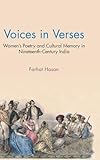Voices in verses : women's poetry and cultural memory in nineteenth century India / Farhat Hasan.
Material type: TextLanguage: English Publication details: New York : Cambridge University Press, 2024.ISBN:
TextLanguage: English Publication details: New York : Cambridge University Press, 2024.ISBN: - 9781009453035
- Urdu poetry -- Women authors -- History and criticism
- Urdu poetry -- India -- History and criticism
- Urdu poetry -- 18th century -- History and criticism
- Urdu poetry -- 19th century -- History and criticism
- Persian poetry -- Women authors -- History and criticism
- Persian poetry -- India -- History and criticism
- Persian poetry -- 18th century -- History and criticism
- Persian poetry -- 19th century -- History and criticism
- Women and literature -- India -- History
 Print
Print
| Item type | Home library | Collection | Shelving location | Call number | Status | Notes | Date due | Barcode | |
|---|---|---|---|---|---|---|---|---|---|
 Print
Print
|
FOBJGU Sonepat- Campus | Special Collection - Chandra Chari | FOB Library | 891.43914099287 HA-V (Browse shelf(Opens below)) | Available | Gifted by Chandra Chari | 027010 |
Browsing FOBJGU Sonepat- Campus shelves, Collection: Special Collection - Chandra Chari Close shelf browser (Hides shelf browser)

|

|

|

|

|

|

|
||
| 823.92 SI-S Sinema : the bollywood bungle of Andy Duggal / | 891.4312 RI-D Drunk on love : the life, vision and songs of Kabir / | 891.43913 RA-E The essential Ghalib / | 891.43914099287 HA-V Voices in verses : women's poetry and cultural memory in nineteenth century India / | 891.44171 CH-P Poem continuous : reincarnated expressions / | 895.63 HI-N Newcomer / | 909 NA-H Historical perspective : illuminating minds on blue water / |
Includes bibliographical references and index.
Unravelling the Texts : Memory, Reforms, and Literary Sulh-i-Kul -- Representing an Inclusive Literary Culture : Women Poets in the Bazaars and Kothas -- Representing the Kothas : The Two Sisters in the Literary Sphere -- Commemorating Women Poets : Memory, Gender, and the Literary Culture in the Persianate World -- Secluded Poets in Literary Spaces : Memorializing Female Rulers, Consorts, and Memsahibs.
"This book opens up an archive of women's verses found in the extant, but overlooked, women's biographical compendia (tazkira-i zanāna) written in the nineteenth century. As commemorative texts, these compendia written in Urdu draw our attention to their memories--celebrated and contested--in cultural spaces. In drawing connections between memory and literature, this study contests the commonplace assumption that the literary public sphere was markedly homosocial and gender exclusive, and argues instead that the women poets, coming from a wide variety of social groups, actively participated in shaping the norms of aesthetics and literary expression; they introduced fresh signifiers and signifying practices to apprehend their emotions, experiences, and world views. Women's poetry was a kind of 'subjugated'/'erudite' knowledge that enriched the literary culture, even as it evoked considerable anxieties, and stood in a paradoxical relationship with the dominant episteme, both reinforcing and challenging its cultural assumptions and truth-claims. Their lyrics were forms of self-narratives or an act of 'unveiling', but in order to appreciate their meanings we need to be sensitive to the multi-medial mode of meaning-apprehension. This work suggests that the women's tazkiras performed an act of 'epistemic disobedience' contesting not only the British imperial representations of India, but also the Indo-Muslim modern reformers on issues of domesticity, conjugal companionship, and love and desire"--
There are no comments on this title.

